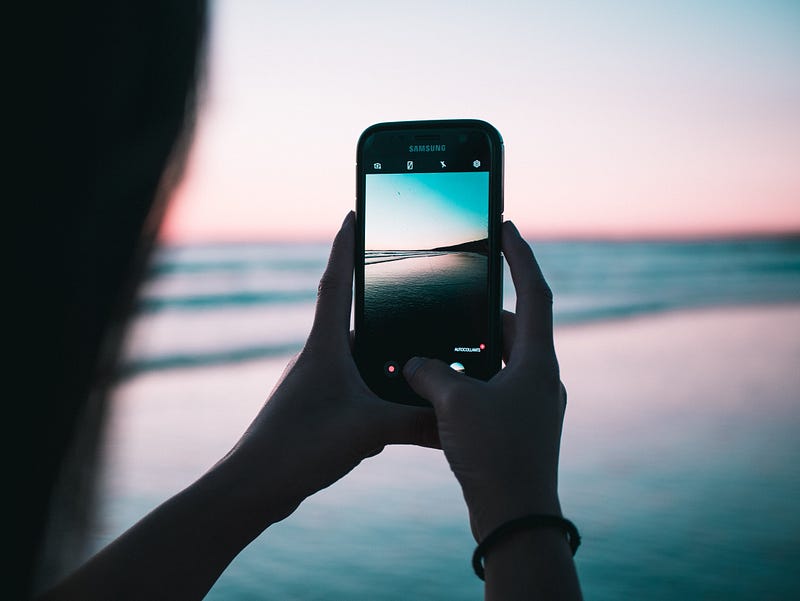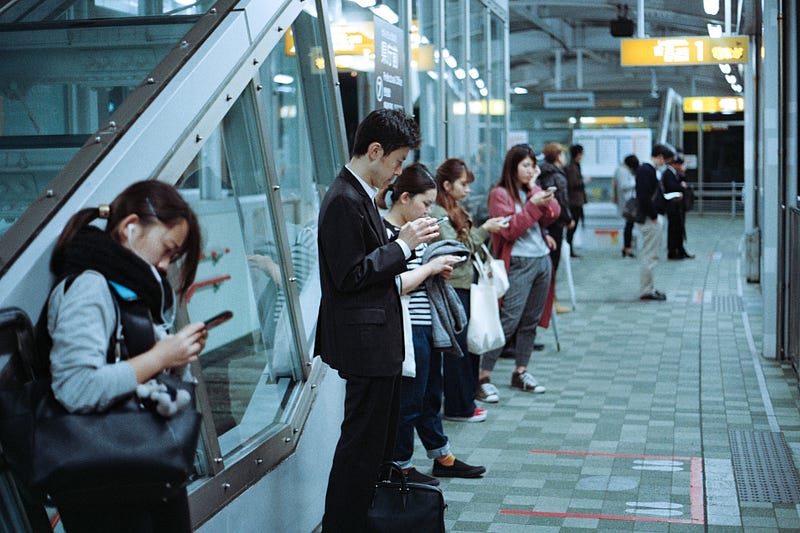Reclaiming Life from the Smartphone: A Personal Journey
Written on
I (and my family) versus the smartphone

Struggling to reclaim focus, attention, and independence
Recently, I’ve come across numerous articles discussing the negative impacts smartphones have on our lives (often read on my own iPhone, ironically). I suspect you’ve seen them too. I've become convinced of their potentially harmful influence and how they can easily take over our lives, robbing us of valuable time. While I attempt to balance this with the undeniable advantages and convenience smartphones provide, I often feel like I'm losing the fight.
I've made efforts to limit my screen time, experiencing a mix of pride and disappointment when I receive notifications about my daily average. I've eliminated the most distracting apps from my phone, adjusted settings so it remains inactive when picked up, and experimented with color filters to make the screen less appealing. Additionally, I've set voluntary limits on my usage at various times throughout the day.
Despite these efforts, my smartphone still seems to exert an uncomfortable control over my life.
Acknowledging the existence of a problem is the first step, right? I'm determined to take charge and eventually return to a state where my phone serves my needs instead of the other way around. Accepting any other outcome would mean admitting to weakness, lack of discipline, and a failure to take responsibility—traits that clash with my self-image and aspirations.
I've even considered downgrading to a basic cell phone, primarily for calls and occasional texts. My family, especially the kids, scoff at the idea and question my credibility, yet I wonder if this might be my eventual path. So far, my reasons for holding onto my smartphone include:
- The utility of checking emails for work and personal tasks (even though since deleting Facebook and Twitter, my email has become my go-to during idle moments).
- Daily podcasts and audiobooks—while I could dig out an old iPod for this, the convenience of my smartphone is undeniable.
- Staying connected with distant family and friends through FaceTime, WhatsApp, and group chats—old-fashioned calls and texts wouldn’t suffice.
- I can't recall the last time I did online banking without my phone app; visiting a physical branch feels like a distant memory.
- Having a decent camera handy is a plus, even though I do own a digital camera (somewhere).
I could probably list more reasons, but these are the immediate thoughts that come to mind.
The fact that I feel compelled to justify keeping my phone troubles me. It highlights a weakness in my ability to use it moderately, fulfilling my needs without relying on these justifications. My struggle to keep my screen time under two hours a day suggests these aren't my only uses.
Compared to others, I think my smartphone use is still relatively low, but that doesn’t bring me comfort. I view it as a problem due to both the time wasted and the potential negative effects, much like my concerns about vaping. Who knows what long-term implications it carries? While perhaps a better alternative to smoking, is vaping really healthier than just breathing plain air? I suspect there will be consequences for those of us who can't moderate our smartphone use.
Another driving factor behind my desire to change is my observation of my family's smartphone habits. I feel I can't effectively advocate for change if I’m not setting a good example myself.
Here are some behaviors I've noticed in my immediate family. I’m sure they’re no worse than 98% of the smartphone-using population, but they still concern me. For context, we are a blended family of six, including myself, my wife, and our four children aged 10, 13, 15, and 19. All of us use iPhones and have relatively unlimited access to data, network coverage, and streaming services (Netflix and Spotify, which I fund for the family).
I fully acknowledge my role in enabling this situation, as my wife and I provided the devices. This could easily be viewed cynically, like a bar owner complaining about rowdy patrons after serving them too much cheap alcohol.
You may have encountered similar behaviors, but I want to share them candidly and honestly.
Smartphone use steals time and drains attention – It frustrates me to hear my kids refer to "going on their phone" as a way to kill time. The device has taken precedence over activities that are undeniably more positive and enriching. In my youth, before smartphones existed, we spent time outdoors with friends, playing and exploring responsibly. Alone time was filled with reading, watching TV, or practicing sports—activities that engaged my body and mind. While some smartphone games and apps have educational value, I doubt that applies to Snapchat, Instagram, or Candy Crush, where I often find my family aimlessly wasting hours.
Equally disheartening is the ease with which attention shifts from one distraction to another. It seems our attention spans have shrunk, with the only satisfaction derived from cycling through apps for a quick dopamine fix—Facebook, Instagram, Snapchat, WhatsApp, and back again—constantly checking for updates. If a single app were truly engaging, wouldn't it hold our attention for hours? Instead, we find ourselves in a cycle of distraction rather than deep engagement.
The addiction to endorphin release from apps and social media is real – My older children are particularly adept at navigating social media. I’ve watched them meticulously curate their Instagram posts, analyzing and strategizing their release with a marketing finesse reminiscent of a modern-day Don Draper. It seems the act of sharing an appealing photo isn't the main goal (a misconception on my part), but rather how it’s received by their followers. The validation from a group often made up of people they don’t like or even know matters more than the quality of the image itself. No matter the platform, the primary objective appears to be reveling in the attention and feedback received. Is that healthy? I don't believe so, yet I find myself falling into the same trap—sharing an article on LinkedIn to provide value, but still seeking validation through engagement. Positive responses make me feel good, while indifference leaves me feeling frustrated.
Smartphones hinder our ability to complete routine tasks – My younger children exemplify this well. When my wife wakes them for school, they surrender their phones until they’re dressed, fed, and ready to leave. If their phones are mistakenly left with them, it can take them ten to fifteen minutes longer to get ready. Sports equipment and homework are often forgotten, as the allure of the phone and the distractions it unlocks are simply too tempting. I’ve watched in disbelief as they struggle to tie their shoelaces or put on a coat while engrossed in a YouTube video. Nothing is more exasperating than watching a simple task become complicated by a lack of focus.

Physical consequences abound; poor posture and ‘swipers-thumb’ are just two – The adverse effects of smartphone use extend beyond behavior; they manifest physically. Look around in any waiting room or on public transport, and you’ll see countless people hunched over their phones, heads down in that all-too-familiar posture. The way we hold our phones isn’t natural either, and I often experience thumb pain from swiping back and forth across the screen. As a tall person, I’m acutely aware of the aches and pains that arise from poor posture over the years. I can't afford another source of physical discomfort; gym-related pains are already challenging enough!
Smartphones promote an over-reliance on calling or texting for trivial matters – In our home, there's ongoing contention over how often my children reach for their phones. While communication is important, they often use it to ask trivial questions they could resolve themselves, seek validation they shouldn't need, or simply kill time. I never thought I’d want to encourage my kids to communicate with me less, but at times, their ease of reaching out seems to rob them of initiative and self-reliance. It feels as though I’m being used as a diversion when they call around family members to chat while waiting for a bus. It seems we’ve lost the ability to sit quietly with our thoughts or occupy ourselves without a colorful screen.
An inability to plan ahead or keep commitments – I’m unsure if it's a byproduct of knowing they can reach out anytime, but they seem less capable of making simple plans and sticking to them. In my youth, I had to consider when I needed a ride from my parents and ensure I was on time. Nowadays, I often find myself waiting at a designated spot only to receive a call from them saying they’re on their way or asking for more time. They seem to think that since we’re in contact, they’ve fulfilled their commitment, disregarding the importance of respecting the arrangement. To some extent, this issue may stem from my parenting, but it’s disappointing nonetheless.
Smartphones can trigger excessive overthinking based on others' reactions – Many are familiar with features that allow users to see when messages have been read or when someone is online. This can lead to frustration when one sees a message read but receives no response for minutes, hours, or even days. Such situations often cause annoyance in our household, whether the kids are seeking something or when we’re trying to get in touch with them. You would think that with the prevalence of smartphones, it would be easier to reach someone when needed. Unfortunately, that’s not always the case.
They can lead to an inability to make decisions, fostering a lack of confidence – As I write this, my eldest child, currently studying abroad, has just called to ask if she has time to use the restroom at the airport before her flight boards. What does she expect me to say? Such calls are becoming commonplace, particularly since she recently moved overseas. Just because we can reach out for reassurance doesn’t mean we should constantly seek validation for even the most trivial decisions. In my university days, I adapted to life on my own with limited contact, calling my parents once a week from a payphone. That system worked; I learned to navigate life independently.
Is there a danger that we may be losing the ability to take initiative and solve our own problems, given how easy it is to consult others or search for answers online?

Diminished ability to connect with others face-to-face – I recognize that not everyone is the same when it comes to social interaction—some are introverted while others are extroverted. However, it’s clear that social media allows people to present a confident persona, which can be misleading. Many struggle to engage in meaningful face-to-face conversations, preferring the safety of their phones. Instead of fostering sociability, smartphones and social networks can perpetuate isolation.
You only need to attend a gathering or sit at a dinner table where some individuals are glued to their phones rather than conversing to understand my point.
I could continue indefinitely, sharing my concerns about the pervasive influence of smartphones in our lives. Yet, my primary worry lies with how it affects my family, friends, and myself. As I write, I suspect that my wife and kids are all engaged with their phones in some capacity, or have been in the last few minutes. I often wonder how they would be spending their time if we could rewind the clock by 25 years. Would they engage in healthier or more positive activities? Would we be happier? Who can say?
At this point, I don’t have clear answers to these questions. My plan is to pursue a stricter self-imposed limit on smartphone usage. If I can manage to use it differently from how others do—without the frustrations I’ve outlined—I’ll be better positioned to determine whether it’s worth the effort to encourage them to change their habits as well.
I’ll keep you updated.
Toby
If you appreciate articles like this and want to support writers on Medium, consider becoming a Medium member. It’s $5 per month for unlimited access to stories. Signing up through my link will earn me a small commission.
Join Medium with my referral link - Toby Hazlewood
As a Medium member, a portion of your membership fee goes to writers you read, and you get full access to every story…
tobyhazlewood.medium.com
If you’ve enjoyed this article, please feel free to join my email list.

This story is published in The Startup, Medium’s largest entrepreneurship publication followed by over 415,678 people.
Subscribe to receive our top stories here.
